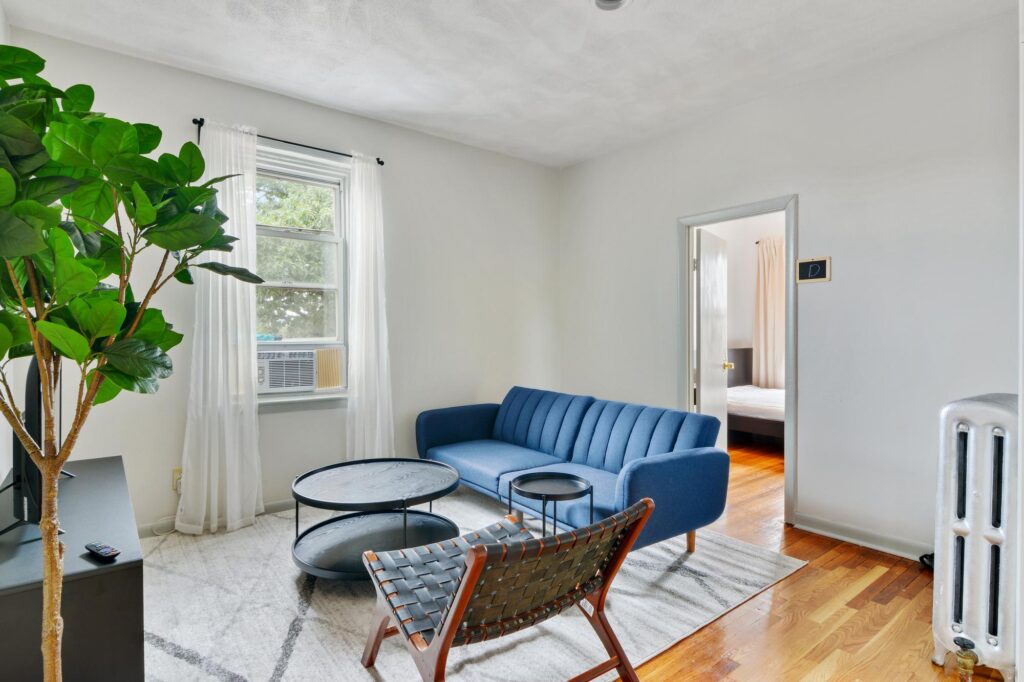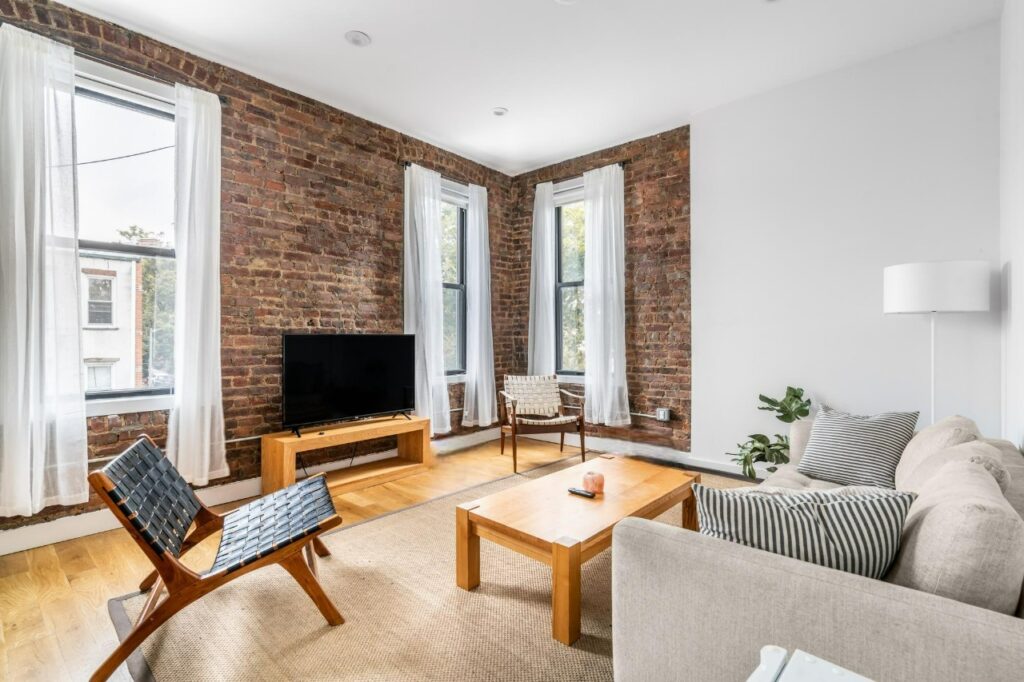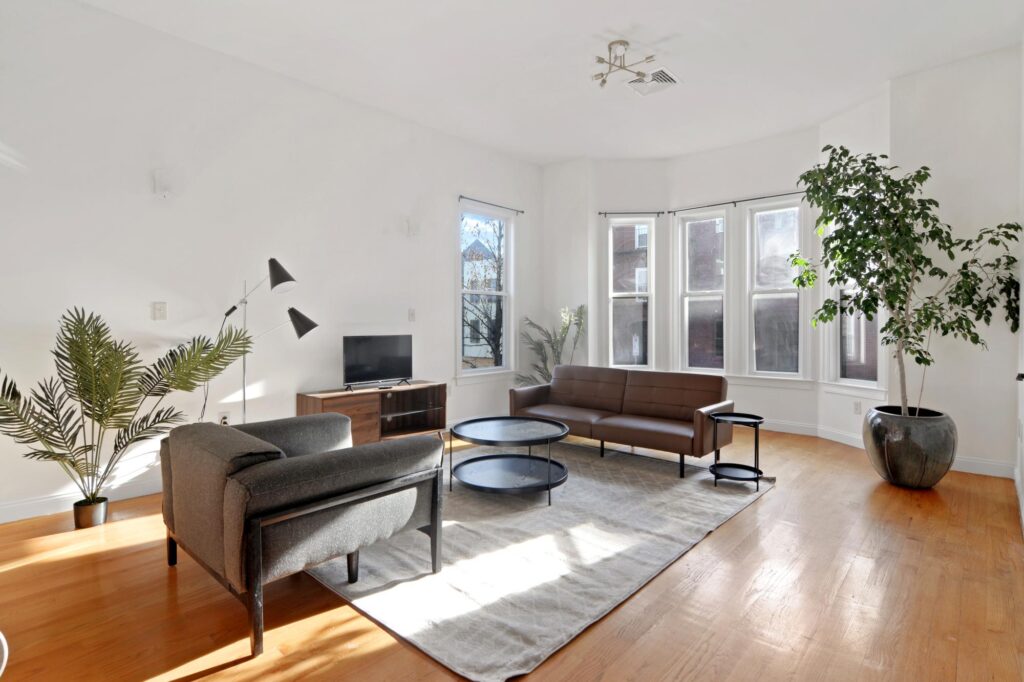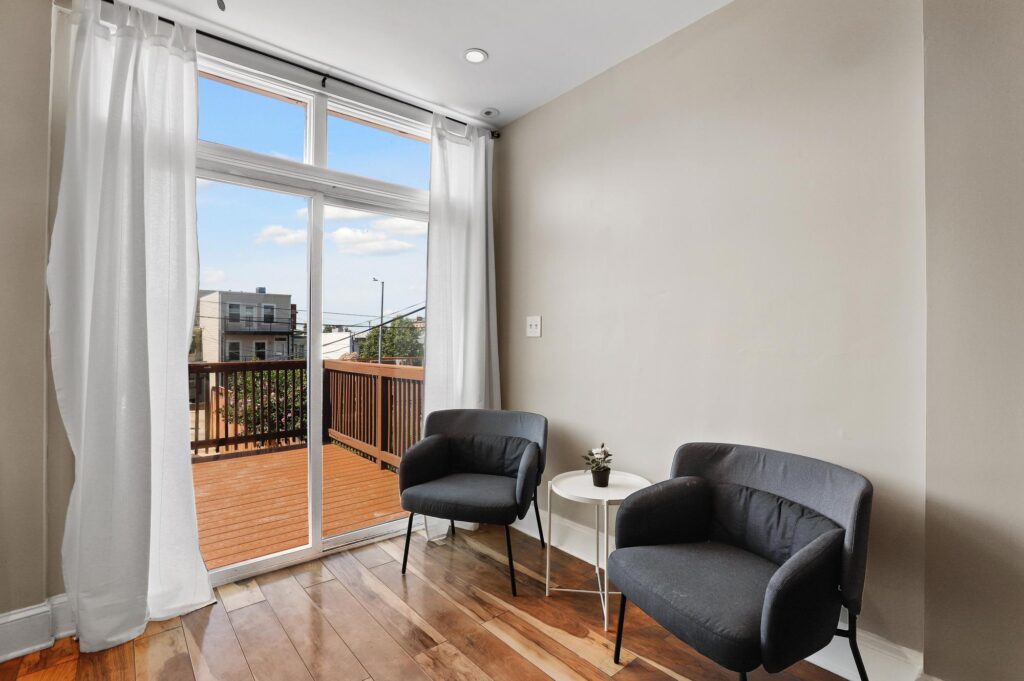Estimated reading time: 21 minutes

So, how to rent in the U.S. as a foreigner? You need valid immigration status, proof of income (40-60x monthly rent) or guarantor (80x monthly rent), and proper documentation. Use June Homes for visa-friendly applications with no broker fees, or combine StreetEasy with international guarantor services. Start 45-60 days before move-in and prepare $5,000-15,000 for initial costs.
Essential requirements:
- Complete documentation – All translated if needed
- Valid visa/immigration status – No exceptions
- Income proof OR guarantor – Must meet 40x or 80x requirements
- US bank account – Critical for applications
Now, to the details.
Enjoy a hassle-free, high-end rental experience for stays of one month or longer in major US cities.

Fully-furnished rooms and apartments with flexible lease. Apply today and move in tomorrow.
Understanding U.S. Rental Requirements by Visa Type

F-1/J-1 Student Visas
Required documents:
- Valid I-20 or DS-2160 form
- University enrollment verification letter
- Financial aid documentation or sponsor letters
- Student account bank statements (3 months minimum)
- Academic transcript showing good standing
Special considerations:
- Many landlords prefer students with school-backed guarantees
- Summer housing gaps need planning (subletting restrictions)
- Off-campus housing office resources often international-friendly
- Work authorization limits affect income verification
Income alternatives:
- Parent/family guarantor (most common)
- Scholarship/grant documentation
- Teaching/research assistantship proof
- International student loan documentation
H-1B/L-1/O-1 Work Visas
Required documents:
- Valid work visa and I-94 entry record
- Employment authorization document (EAD) if applicable
- Job offer letter with salary details
- First 2-3 pay stubs (if already working)
- Employment verification letter from HR
Advantages:
- Steady income makes applications stronger
- Corporate relocation assistance often available
- H-1B specialty workers often meet income requirements easily
- Many employers provide temporary housing assistance
Challenges:
- Visa renewal uncertainty concerns some landlords
- Gap between job start and first paycheck
- Corporate housing may delay permanent rental search
Green Card Holders
Required documents:
- Permanent resident card (front and back copies)
- Employment verification
- Credit report (if established)
- Bank statements
Advantages:
- No visa renewal concerns for landlords
- Easier to establish US credit history
- Eligible for most housing assistance programs
- Can use US employment history for applications
Asylum Seekers/Refugees
Required documents:
- Work authorization document
- Asylum approval notice or refugee documentation
- Employment verification (if applicable)
- Sponsor organization letters (if applicable)
Resources:
- Refugee resettlement agencies often provide housing assistance
- Many cities have asylum seeker support organizations
- Legal aid societies can help with documentation
Financial Requirements Deep Dive
The 40x Rule Explained
Standard requirement: Annual income must be 40x monthly rent
- $2,000/month rent = $80,000 annual income needed
- $3,000/month rent = $120,000 annual income needed
- Must be provable through pay stubs, offer letters, or bank statements
The 80x Rule with Guarantors
When you need a guarantor: If you don’t meet 40x requirement
- Guarantor needs 80x monthly rent in annual income
- $2,000/month rent = $160,000 guarantor income needed
- Guarantor must provide same documentation as primary applicant
Alternative Financial Verification
For newcomers without US income:
- Asset-based approval: Show 12-24 months rent in liquid assets
- Prepaid rent: Offer 6-12 months upfront payment
- International income: Converted to USD with bank verification
- Investment portfolio: Stocks, bonds, other liquid investments
- Family support letters: Notarized financial support guarantees
International Banking Setup
Essential first steps:
- Open US bank account immediately – Even before apartment hunting
- Bring original documents – Passport, visa, I-94, Social Security card (if available)
- International programs: Chase, Bank of America, Wells Fargo have specific international customer services
- Initial deposit: $100-500 typically required to open account
- Banking relationship: 2-3 months of statements help rental applications
- Individual Taxpayer Identification Number (ITIN): Alternative to SSN for banking/credit
- Application process: IRS Form W-7, takes 6-10 weeks
- Banking access: Most major banks accept ITIN for account opening
- Credit building: Can establish credit history with ITIN
Complete Documentation Checklist
Universal Requirements (All Visa Types)
Identification:
- Valid passport (all pages, including blank ones)
- Current visa page in passport
- I-94 arrival/departure record (print from cbp.gov)
- Driver’s license or state ID (if obtained)
Immigration Status:
- Copy of current visa
- I-20/DS-2160 (students)
- Employment authorization document (workers)
- Green card (permanent residents)
Financial Documentation:
- 3 months bank statements (US account preferred)
- Employment verification letter
- Pay stubs (most recent 2-3)
- Tax returns (if filed in US)
- International bank statements (translated if needed)
Translation Requirements
When needed:
- Documents in languages other than English
- Bank statements from foreign institutions
- Employment letters from international companies
- Educational transcripts
Certified translation services:
- American Translators Association (ATA) certified translators
- Cost: $20-40 per page typically
- Timeline: 3-5 business days
- Required for official lease applications
Document Preparation Strategy
📋 ORGANIZATION SYSTEM Create three folders (physical + digital):
- “Original Documents” – Never give these to landlords, only show for verification
- “Certified Copies” – Official copies for application submissions
- “Translated Documents” – Professional translations with certification stamps
⏰ TIMING YOUR DOCUMENT PREPARATION
- 90 days before: Begin gathering international documents (some take weeks to obtain)
- 60 days before: Complete translations and notarizations
- 45 days before: Organize into application packets
- 30 days before: Create digital copies and backup storage
🔄 DOCUMENT PROCESSING WORKFLOW
Step 1: Inventory Check
- List all required documents for your visa type
- Identify missing or expired documents
- Note which documents need translation
- Check expiration dates (get renewals if expiring within 6 months)
Step 2: Professional Translation Services
- Use certified translators only: American Translators Association (ATA) members preferred
- Required for: Bank statements, employment letters, academic transcripts in non-English languages
- Cost planning: $25-50 per page, $200-500 total typical
- Timeline: 5-7 business days for standard documents
Step 3: Notarization and Authentication
- US documents: Local notary public ($10-25 per document)
- International documents: May require apostille certification from origin country
- University documents: Registrar office authentication often required
Step 4: Digital Organization
- Scan everything: High-quality PDFs, organized by category
- Cloud storage: Google Drive, Dropbox for easy sharing with landlords
- Email-ready files: Individual PDFs under 10MB each for application submissions
- Backup copies: Multiple locations (cloud, USB, physical copies)
💡 PRO TIPS FOR DOCUMENT SUCCESS
- Quality matters: Clear, high-resolution scans accepted better than photos
- Complete packages: Submit all documents together, never piecemeal
- Professional presentation: Organized cover sheet listing all included documents
- Quick access: Keep digital copies on phone for immediate sharing during property visits
- Multiple copies: Bring 3-4 complete sets to apartment viewings
Guarantor Guide: Everything You Need to Know
What is a Guarantor?
Definition: Someone who legally agrees to pay your rent if you cannot Responsibility: Co-signer on lease with full financial liability Relationship: Usually family member, close friend, or professional service Duration: Guarantor obligation lasts entire lease term
US vs International Guarantors
US-based guarantors preferred:
- Easier credit and income verification
- US legal jurisdiction for collection
- Familiar with US rental laws
- Some landlords require guarantor in tri-state area (NY, NJ, CT)
International guarantors:
- Accepted by some landlords, rejected by others
- Requires additional documentation and verification
- May need US legal representation
- Currency exchange considerations for payment
Professional Guarantor Services
TheGuarantors (June Homes partner):
- Cost: 70-110% of one month’s rent annually
- Requirements: Review income, credit, and lease terms
- Coverage: Full lease term protection
- Process: Online application, 24-48 hour approval
Leap Easy:
- Cost: 5-8% of annual rent
- Requirements: Income verification and background check
- Coverage: Rent payment guarantee
- Process: Digital application with instant pre-qualification
Rhino:
- Cost: 5-17.5 per month (varies by risk profile)
- Requirements: Credit check and income verification
- Coverage: Security deposit insurance alternative
- Process: Integration with property management systems
Guarantor Application Process
Step 1: Choose guarantor type (personal vs professional service)
Step 2: Gather guarantor documentation (same as tenant requirements)
Step 3: Complete guarantor application (separate from tenant application)
Step 4: Guarantor credit and background check ($50-100 fee typically)
Step 5: Guarantor lease signing (may require notarization)
Regional Market Differences

New York City
Unique requirements:
- Broker fees: 10-15% of annual rent (try to avoid)
- First month + last month + security deposit standard
- Guarantor often must live in tri-state area
- Rent stabilized apartments have special rules
Best neighborhoods for internationals:
- Upper East Side: Safe, expat-friendly, good transportation
- Murray Hill: Young professional area, reasonable prices
- Astoria, Queens: International community, affordable
- Brooklyn Heights: Family-friendly, shorter commute
Timeline: Start 45-60 days early, especially for September moves
Boston
Unique requirements:
- September 1st mass moving day (“Allston Christmas”)
- Many apartments include heat (rare in other cities)
- Student-heavy market affects availability
- First/last/security deposit + broker fee common
Best neighborhoods for internationals:
- Cambridge: International students, near universities
- Somerville: Diverse, artsy, good public transit
- Back Bay: Upscale, convenient to downtown
- Jamaica Plain: Affordable, diverse community
Timeline: Start 60-90 days early for September, 30-45 days other times
Washington DC
Unique requirements:
- Security clearance considerations for some buildings
- Government employee preference in some areas
- Metro accessibility crucial for commuting
- Competitive market with quick decisions needed
Best neighborhoods for internationals:
- Dupont Circle: International community, embassy row nearby
- Capitol Hill: Young professionals, walkable
- Arlington, VA: International business community
- Alexandria, VA: Family-friendly, diverse
Chicago
Unique requirements:
- First month + security deposit standard
- Winter heating costs can be substantial
- Parking often separate rental ($100-200/month)
- Lake proximity affects pricing
Best neighborhoods for internationals:
- Lincoln Park: Young professionals, safe
- Lakeview: Diverse, good nightlife
- River North: Urban living, high-rise buildings
- Evanston: Family-friendly, Northwestern University area
Application Strategy and Timeline
90 Days Before Move-in
Setup phase:
- Open US bank account
- Apply for ITIN if no SSN
- Research target cities and neighborhoods
- Begin document gathering and translation
- Connect with guarantor or research services
60 Days Before Move-in
Preparation phase:
- Finalize all documentation
- Create profiles on rental platforms
- Research neighborhoods in person (if possible)
- Connect with international student/worker communities
- Budget for all moving costs
30-45 Days Before Move-in
Active search phase:
- Set up automated alerts on rental platforms
- Schedule neighborhood visits
- Begin viewing apartments
- Network with local contacts
- Prepare application packages
2-4 Weeks Before Move-in
Application phase:
- Submit applications same day as viewing
- Follow up within 24 hours on all applications
- Be ready to provide additional documentation quickly
- Have backup options prepared
- Confirm guarantor availability
1-2 Weeks Before Move-in
Finalization phase:
- Complete lease signing process
- Schedule move-in inspection
- Set up utilities and services
- Confirm temporary housing if needed
- Prepare for actual move
Housing Types and Options

Studio Apartments
- Best for: Single professionals, students with limited budgets
- Pros: Lower cost, easier to qualify, minimal furnishing needed
- Cons: Limited space, no privacy for guests
- Typical cost: $1,200-3,500/month depending on city and neighborhood
- International considerations: Good starter option while establishing US residency
One-Bedroom Apartments
- Best for: Working professionals, couples
- Pros: Privacy, space for home office, entertaining space
- Cons: Higher qualification requirements, more expensive
- Typical cost: $1,800-5,000/month depending on location
- International considerations: May require higher income verification
Shared Housing/Roommates
- Best for: Students, new arrivals, budget-conscious renters
- Pros: Lower individual cost, built-in social network, shared responsibilities
- Cons: Less privacy, potential conflicts, shared lease liability
- Typical cost: $800-2,500/month per room
- International considerations: Good way to learn local culture
Furnished vs Unfurnished
Furnished apartments:
- Pros: No furniture investment, good for temporary stays, included utilities often
- Cons: Higher monthly cost, limited personalization, quality varies
- Best for: Short-term stays, corporate relocations, students
Unfurnished apartments:
- Pros: Lower monthly cost, personalization freedom, long-term investment
- Cons: Upfront furniture costs, moving complexity, storage needs
- Best for: Long-term residents, families, established professionals
Luxury vs Budget Housing
Luxury amenities to consider:
- Doorman/concierge services (helpful for package delivery)
- In-unit laundry (saves time and money)
- Gym/fitness center (eliminates membership costs)
- Rooftop/common areas (social opportunities for internationals)
Budget considerations:
- Older buildings may lack modern amenities
- Walk-up apartments (no elevator) reduce costs
- Outer neighborhoods offer better value
- Shared amenities reduce individual costs
Legal Rights and Protections
Fair Housing Act Protections
Protected categories: Race, color, national origin, religion, sex, familial status, disability
What this means for internationals: Cannot be discriminated against based on national origin or accent
Illegal practices: Refusing to rent, different terms/conditions, false unavailability claims
How to report: File complaint with HUD (Department of Housing and Urban Development)
Security Deposit Laws
Federal guidelines: No federal limit, but states regulate maximum amounts State variations:
- New York: No limit, but 1-2 months typical
- Massachusetts: First month + last month + security deposit maximum
- California: 2 months maximum for unfurnished, 3 months for furnished
- Illinois: No state limit, local ordinances may apply
Security deposit rights:
- Must be held in separate account (some states)
- Interest payments required (some jurisdictions)
- Written damage deduction itemization required
- Return timeline regulated (14-60 days varies by state)
Lease Break Rights and Penalties
Early termination clauses: Review carefully before signing Military deployment: Special protections under federal law Domestic violence: Many states provide lease break protections Job relocation: Not automatically protected, negotiate upfront Typical penalties: 1-2 months rent, loss of security deposit, remaining lease liability
Tenant Rights During Tenancy
Habitability rights: Landlord must maintain safe, livable conditions Privacy rights: 24-48 hour notice required for entry (varies by state) Rent increase limitations: Rent controlled/stabilized units have restrictions Repair and maintenance: Reasonable timeframe for landlord response required
Cultural Adaptation Guide
American Rental Culture Norms
Landlord-tenant relationship:
- Professional but friendly communication expected
- Written documentation preferred for all requests
- Prompt rent payment highly valued (never late)
- Property care and cleanliness expected
Communication styles:
- Direct, clear communication appreciated
- Email preferred for maintenance requests
- Response within 24-48 hours expected
- Professional tone in all interactions
Building Etiquette
Shared spaces:
- Keep common areas clean after use
- Respect quiet hours (typically 10 PM – 8 AM)
- Hold elevators for neighbors
- Introduce yourself to immediate neighbors
Laundry facilities:
- Don’t leave clothes unattended long-term
- Clean lint traps after use
- Respect reserved/broken machine signs
- Peak times vary by building (weekends often busy)
Maintenance and Repairs
Emergency repairs: Contact landlord/management immediately
- Flooding, gas leaks, electrical issues, heating failures (winter)
- Available 24/7 contact information should be provided
Non-emergency repairs: Written request preferred
- Include photos if possible
- Reasonable timeframe expectation (3-7 days typical)
- Follow up if no response within stated timeframe
Tenant responsibilities:
- Light bulb replacement
- Basic cleaning and upkeep
- Reporting issues promptly
- Allowing access for scheduled repairs
Cost Analysis and Budgeting
Comprehensive Cost Breakdown by City
New York City (Manhattan room):
- Monthly rent: $2,000-4,000
- Security deposit: $2,000-4,000
- Broker fee: $2,500-6,000 (if applicable)
- Guarantor service: $1,600-3,200 annually
- Utilities: $100-200/month
- Total first month: $6,000-15,000
- Monthly rent: $1,200-2,500
- Security deposit: $1,200-2,500
- First/last month: $2,400-5,000
- Broker fee: $1,200-2,500 (if applicable)
- Utilities: $75-150/month
- Total first month: $4,500-10,000
- Monthly rent: $1,800-3,500
- Security deposit: $1,800-3,500
- Application fees: $50-200
- Utilities: $100-180/month
- Parking: $150-300/month
- Total first month: $3,800-7,200
Chicago (studio/one-bedroom):
- Monthly rent: $1,400-2,800
- Security deposit: $1,400-2,800
- Application fees: $25-100
- Utilities: $80-150/month
- Parking: $100-250/month
- Total first month: $2,900-5,750
Hidden Costs for Internationals
Document preparation:
- Translation services: $200-500
- Notarization: $50-150
- International document authentication: $100-300
Banking and financial:
- International wire transfer fees: $25-50 per transfer
- Currency exchange costs: 2-4% of amount
- US bank account setup: $0-500 depending on initial deposit requirements
Guarantor services:
- Application fees: $50-200
- Annual service fee: 5-110% of monthly rent
- Credit check fees: $25-75
Money-Saving Strategies
Timing your search:
- Off-peak seasons: January-March, October-November
- Mid-month availability often cheaper
- End-of-month pressure on landlords for quick rental
Negotiation opportunities:
- Multiple month upfront payments
- Longer lease terms for reduced monthly rent
- Including utilities in rent for budget certainty
- Waiving broker fees in competitive markets
Shared living benefits:
- Reduced individual qualification requirements
- Shared utility and internet costs
- Built-in social network reducing entertainment costs
- Shared household items and supplies
Technology and Communication
Essential Apps for Apartment Hunting
Primary rental platforms:
- June Homes
- StreetEasy (NYC): Dominant platform, real-time updates, neighborhood data
- Zillow Rentals: National platform, good filtering options
- Apartments.com: Comprehensive listings, virtual tours
- PadMapper: Visual map-based search, Craigslist integration
- HotPads: Real-time updates, mobile-friendly interface
Communication and logistics:
- Google Voice: US phone number without US phone plan
- WhatsApp: International communication with family/guarantors
- Citymapper/Transit: Navigation in major cities
- Venmo/Zelle: US payment apps for deposits and rent
- DocuSign: Electronic lease signing platform
US Phone Number Importance
Why you need it:
- Landlords prefer calling US numbers
- Verification for rental applications
- Building management contact requirements
- Emergency services and delivery coordination
Options for getting US number:
- Google Voice: Free, works internationally, requires Google account
- Skype Number: $60/year, international accessibility
- US prepaid phone: $20-50/month, physical presence
- University/employer plans: Often available for students/workers
Online Application Best Practices
Profile optimization:
- Professional photos (clear headshot, lifestyle photo)
- Complete all profile sections
- Honest but positive description
- Highlight stability factors (job, income, references)
Communication etiquette:
- Respond within 4-6 hours during business days
- Use proper grammar and spelling
- Be specific about your needs and timeline
- Ask thoughtful questions about property and neighborhood
Virtual tour etiquette:
- Test technology beforehand
- Prepare questions in advance
- Take notes during tour
- Follow up with thank you message
Emergency Resources and Backup Plans
When Applications Are Rejected
Common rejection reasons:
- Insufficient income documentation
- Negative credit history or no credit
- Incomplete application materials
- Competition from more qualified applicants
- Landlord preference for US citizens (illegal but happens)
Response strategies:
- Request specific feedback on rejection reasons
- Offer additional documentation or guarantees
- Consider guarantor services if not already used
- Expand search to different neighborhoods or price ranges
- Work with rental brokers who know international-friendly landlords
Temporary Housing While Searching
Extended stay hotels:
- Cost: $100-300/night ($3,000-9,000/month)
- Benefits: Furnished, utilities included, housekeeping
- Locations: Available in all major cities
- Booking: Monthly rates often 20-30% cheaper than nightly
Airbnb monthly rentals:
- Cost: $2,000-6,000/month depending on location and size
- Benefits: More space than hotels, kitchen access, local neighborhood experience
- Booking: 28+ day stays often discounted 40-50%
- Communication: Direct host contact for local recommendations
Corporate housing:
- Cost: $4,000-12,000/month fully furnished
- Benefits: Professional management, business-class amenities
- Providers: Oakwood, BridgeStreet, Corporate Housing by Owner
- Best for: Company-sponsored relocations
Hostels and budget options:
- Cost: $30-80/night for private rooms
- Benefits: International community, central locations
- Locations: Available in major cities, limited suburban options
- Duration: Usually 1-2 week maximum stays
Legal Aid and Advocacy Resources
National organizations:
- Legal Aid Society: Free legal assistance for low-income renters
- National Housing Law Project: Policy advocacy and resources
- HUD (Housing and Urban Development): Federal housing discrimination complaints
City-specific resources:
- NYC: Housing Court Help Center, Met Council on Housing
- Boston: Greater Boston Legal Services, Cambridge Housing Authority
- DC: Legal Aid DC, DC Tenant Advocate Coalition
- Chicago: Metropolitan Tenants Organization, Legal Aid Chicago
Financial Emergency Resources
When you need money quickly:
- International student emergency funds (university-based)
- Embassy assistance programs (country-specific)
- Religious and community organization assistance
- Employer advance programs (for work visa holders)
- International money transfer services (Western Union, Wise)
Building emergency fund:
- 3-6 months expenses recommended
- Keep funds in US bank account for quick access
- Consider money market account for higher interest
- Separate from security deposits and moving costs
Success Stories and Case Studies
Case Study 1: F-1 Student from India
Background: Computer science graduate student, Boston University
Challenge: No US credit history, parents as guarantors in India
Solution: University off-campus housing office connection, June Homes furnished room
Timeline: 2 months search, secured room in Allston
Cost: $1,400/month all-inclusive, $2,800 move-in costs
Lesson: University resources + international-friendly services = success
Case Study 2: H-1B Professional from Germany
Background: Software engineer, relocating to NYC for work
Challenge: Temporary housing while searching, high NYC costs
Solution: Corporate temporary housing + StreetEasy + TheGuarantors
Timeline: 6 weeks search while working, found Upper East Side studio
Cost: $3,200/month rent, $8,000 total move-in costs
Lesson: Corporate support + professional guarantor services work well
Case Study 3: J-1 Researcher from Brazil
Background: Postdoc researcher, Washington DC, 2-year program Challenge: Limited income, temporary visa status Solution: University housing wait list + shared house with other researchers Timeline: 4 months search, found house share in Arlington Cost: $1,100/month including utilities, $3,300 move-in costs Lesson: Academic community networking crucial for temporary visa holders
Case Study 4: Green Card Holder from Nigeria
Background: Marketing professional, relocating to Chicago for promotion
Challenge: Building US credit history, unfamiliar with Chicago market
Solution: Established US banking relationship + local broker + employer assistance
Timeline: 3 weeks search, found Lincoln Park one-bedroom
Cost: $2,400/month, $4,800 move-in costs
Lesson: Green card status + employment verification = smoother process
Common Mistakes and How to Avoid Them
Documentation Mistakes
Mistake: Incomplete or expired documents Solution: Create checklist, verify all documents current before applications
Mistake: Poor quality translations or uncertified translations Solution: Use ATA-certified translators, budget for professional services
Mistake: Missing visa extension documentation Solution: Always include current immigration status, even if renewal pending
Financial Mistakes
Mistake: Underestimating total move-in costs Solution: Budget 3-4x monthly rent for first-month expenses
Mistake: Not establishing US banking relationship early Solution: Open bank account immediately upon arrival, build 2-3 months history
Mistake: Relying solely on international guarantors Solution: Research guarantor services as backup option
Search Strategy Mistakes
Mistake: Starting search too late or too early Solution: 45-60 days optimal for most markets, 90 days for competitive situations
Mistake: Limiting search to one platform or method Solution: Use multiple platforms, network with local communities, consider June Homes
Mistake: Not visiting neighborhoods before committing Solution: Spend time in target areas, test commutes during rush hour
Application Mistakes
Mistake: Incomplete applications or slow response times
Solution: Prepare complete application packages, respond same day to landlord inquiries
Mistake: Not following up on applications
Solution: Professional follow-up within 24-48 hours, express continued interest
Mistake: Applying to unsuitable properties to practice
Solution: Research thoroughly before applying, focus on realistic matches
Frequently Asked Questions
Can I rent without a Social Security Number?
Answer: Yes, most landlords accept ITIN (Individual Taxpayer Identification Number) or other documentation. Many focus more on income verification and visa status than SSN.
Do I need a US credit score to rent?
Answer: Not always. Many landlords accept international credit reports, focus on income verification, or require guarantors instead of relying solely on US credit scores.
Can my parents in another country be my guarantors?
Answer: Some landlords accept international guarantors, but many prefer US-based guarantors. Professional guarantor services often provide better acceptance rates.
How long does the application process take?
Answer: Applications typically process within 24-72 hours, but can take up to 1 week for complex situations involving international documentation or guarantors.
What happens if I need to break my lease early?
Answer: Review your lease’s early termination clause. Penalties typically range from 1-2 months’ rent. Some states provide protections for specific circumstances.
Can I negotiate rent prices?
Answer: Limited negotiation possible in competitive markets, but more opportunity in off-peak seasons or with longer lease terms. Focus on other terms if rent isn’t negotiable.
What utilities are typically included in rent?
Answer: Varies by property. Heat often included in older buildings, electricity/gas/internet typically separate. All-inclusive options like June Homes simplify budgeting.
How do I handle maintenance issues?
Answer: Report issues promptly in writing (email preferred). Emergency repairs require immediate notification, non-emergency repairs typically addressed within 3-7 days.
Conclusion and Action Plan
Renting in the U.S. as a foreigner requires preparation, patience, and understanding of local requirements. Success depends on proper documentation, realistic budgeting, and choosing the right search strategy for your situation.
Your 30-Day Action Plan
Days 1-7: Foundation Setup
- Open US bank account
- Gather and translate all documents
- Research target cities and neighborhoods
- Calculate realistic budget including all costs
- Apply for ITIN if needed
Days 8-14: Market Research
- Create profiles on rental platforms
- Connect with local international communities
- Research guarantor options
- Set up rental alerts for target areas
- Plan neighborhood visits
Days 15-21: Active Search
- Begin viewing properties
- Submit applications for favorites
- Network with potential roommates
- Follow up on applications
- Maintain backup options
Days 22-30: Finalization
- Complete lease negotiations
- Finalize guarantor arrangements
- Schedule move-in logistics
- Set up utilities and services
- Plan actual move
Key Success Factors
- Start early – Give yourself adequate time for the process
- Be prepared – Have all documentation ready before searching
- Stay flexible – Consider different neighborhoods and housing types
- Use multiple strategies – Combine platforms, networking, and services
- Professional approach – Treat applications like job applications
- Build relationships – Connect with local international communities
- Budget realistically – Account for all costs, not just monthly rent
When to Choose June Homes
Consider June Homes if you:
- Want a streamlined, international-friendly application process
- Prefer furnished, move-in-ready accommodations
- Value all-inclusive pricing for budget certainty
- Don’t want to deal with broker fees
- Need flexible lease terms
- Want professional management and maintenance
Final Thoughts
The U.S. rental market can seem overwhelming for international newcomers, but thousands successfully navigate it every year. With proper preparation, realistic expectations, and the right resources, you can find housing that makes your American experience positive and memorable.
Remember that your first rental doesn’t have to be perfect – it just needs to be a good starting point while you establish yourself in the U.S. As you build credit history, local references, and familiarity with your new city, future moves will become much easier.
The investment in time and money you make in securing proper housing will pay dividends in your overall American experience. Take the process seriously, but don’t let it overwhelm you. Focus on one step at a time, and soon you’ll have keys to your new home in America.
Discover Your Perfect Home Away from Home with June Homes
Whether you’re seeking a short-term rental in NYC, a furnished apartment in Boston, a cozy room in Chicago, or a short-term rental in Philadelphia, we’re here to assist. Reach out to us with your preferences, and let us lead you to the residence of your dreams.




